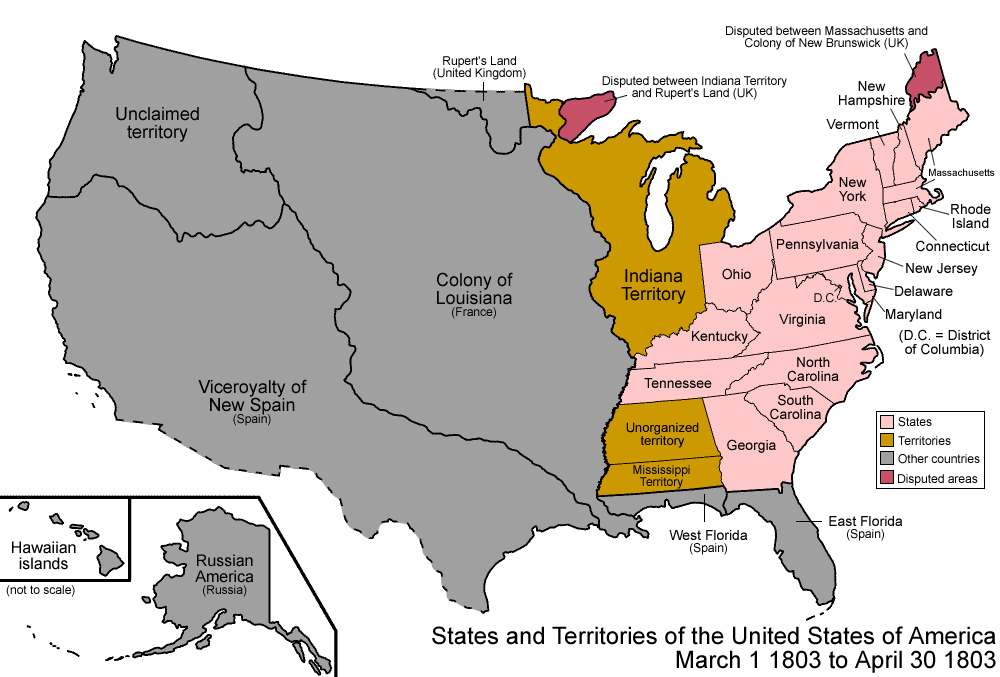As recorded by French Minister of the Treasury, Barbé de Marbois, Napoleon decides to sell the entire Louisiana colony to the United States forever altering the history of the younger nation and a decision necessary for the success of the Western Expedition.
French Colony of Louisiana
By WikiCommons user Golbez. Permission to copy granted via the GNU Free Documentation License.
Spain disputed the borders of the French colony as depicted above. They opposed the inclusion of West and East Florida as part of the Louisiana Purchase and disagreed with the United States’ claim that it now owned lands tributary to the Mississippi River, including the Missouri River. Thus, they would oppose the Lewis and Clark Expedition and attempt to stop it and arrest Meriwether Lewis. See Louisiana’s Political Geography.
On this day, Napoleon announces his decision to sell the Colony of Louisiana:
Irresolution and deliberation are no longer in season; I renounce Louisiana. It is not only New Orleans that I will cede; it is the whole colony, without any reservation. I know the price of what I abandon, and I have sufficiently proved the importance that I attach to this province, since my first diplomatic act with Spain had for its object the recovery of it. I renounce it with the greatest regret. To attempt obstinately to retain it would be folly. I direct you to negotiate this affair with the envoys of the United States. Do not await the arrival of Mr. Monroe: have an interview this very day with Mr. Livingston; but I require a great deal of money for this war, and I would not like to commence it with new contributions. For a hundred years France and Spain have been incurring expenses for improvements in Louisiana, for which its trade has never indemnified them. Lage sums, which will never be returned to the treasury, have been lent to companies and to agriculturists. The price of all these things is justly due to us. If I should regulate my terms, according to the value of these vast regions to the United States, the indemnity would have no limits. I will be moderate, in consideration of the necessity in which I am of making a sale. But keep this to yourself. I want fifty millions, and for less that that sum I will not treat.[1]Barbé de Marbois, The History of Louisiana, anonymous translator (Philadelphia: Carey & Lea., 1830), 274–5 retrieved from https://archive.org/details/historyoflouisia00barb on 4 May 2022. See … Continue reading
Notes
| ↑1 | Barbé de Marbois, The History of Louisiana, anonymous translator (Philadelphia: Carey & Lea., 1830), 274–5 retrieved from https://archive.org/details/historyoflouisia00barb on 4 May 2022. See also Henry Adams, The History of the United States of America during the first administration of Thomas Jefferson (New York: Charles Scribner’s Sons, 1921), 484–486. That this occurred on 10 April 1803, see Harry Ammon, The Quest for National Identity (Charlottesville: University of Virginia Press, 1990), 209. |
|---|
Experience the Lewis and Clark Trail
The Lewis and Clark Trail Experience—our sister site at lewisandclark.travel—connects the world to people and places on the Lewis and Clark Trail.
Discover More
- The Lewis and Clark Expedition: Day by Day by Gary E. Moulton (University of Nebraska Press, 2018). The story in prose, 14 May 1804–23 September 1806.
- The Lewis and Clark Journals: An American Epic of Discovery (abridged) by Gary E. Moulton (University of Nebraska Press, 2003). Selected journal excerpts, 14 May 1804–23 September 1806.
- The Lewis and Clark Journals. by Gary E. Moulton (University of Nebraska Press, 1983–2001). The complete story in 13 volumes.


